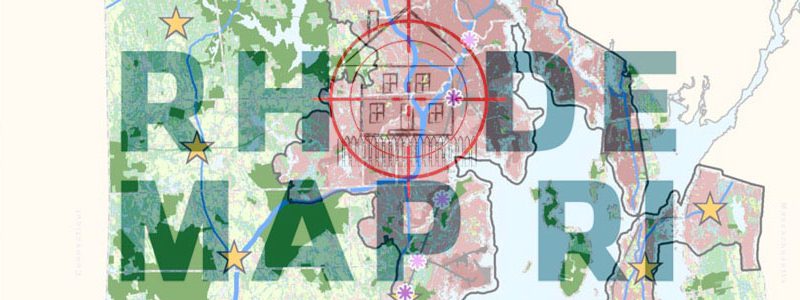COMMENTARY: State Property Tax Proposal Right out of RHODEMAP RI Playbook
By Mike Stenhouse
We warned you about RhodeMap RI.
While Gov. Gina Raimondo’s proposed new statewide property tax has already inspired arguments among various constituent groups, there are much larger, more fundamental issues to be concerned about.
Disguised as a wealth tax, the “Taylor Swift tax” is really an assault on private property rights and an infringement on municipal sovereignty, all part of a national agenda. Sound familiar? This tax idea is right out of the RhodeMap RI playbook, and it was probably designed by a nationally prominent sustainable-living, urban-planning advocate.
The month before the governor introduced this controversial new tax, a Feb. 18 WPRI-12 report confirmed that the Raimondo administration was bringing Brookings Institution scholar Bruce Katz to Rhode Island for private meetings and hinted that the state should find a role for him. Also, in 2013, Ms. Raimondo, in conjunction with the Rhode Island Foundation, brought Mr. Katz, a prominent national expert on urban economic development, to the Ocean State. Mr. Katz also has a relationship with Grow Smart RI, the primary architect for RhodeMap RI.
As our center informed the public during last fall’s RhodeMap RI debate, the underlying philosophy of the sustainable living and urban planning movement is that suburban sprawl, manifested largely through development of private single-family homes, is an unsustainable and inequitable ailment in our world.
In their view, such prime real estate would be more beneficial to society by being turned into “common,” “open space” or “high density” use. The goal of these central planners is to make it incrementally less attractive to own private property by making it more expensive (via tax policy) and by limiting development rights (through regulatory policy).
Since this would be politically unpopular at the local level, the strategy of the central planners is to supersede the authority and ordinances of local town governments by creating new regional authorities and statewide laws, such as the governor’s.
This strategy is clearly represented in the language of the governor’s proposed tax scheme, which describes property ownership as a “privilege.” It then takes the extraordinary step of taxing those properties, much like a “sin” tax.
Home and property ownership is not a privilege, nor is it a sin; it is a cornerstone of the American Dream, of our free-enterprise system, and the foundation of our constitutional rights. By demoting private property ownership to a mere privilege, sustainable living radicals can justify eventually restricting or removing that privilege.
Further, with the state exerting control over property taxes, local governments would find themselves with diminished sovereignty to manage real-estate issues. Cities and towns will have less authority to ensure that they remain attractive to in- or out-of-state homeowners and landlords, which are vital to their local economies.
A March 17 Providence Journal article described even more of the rationale, via familiar “sustainable” terms such as “fair share,” property “deterioration” and “stock of … real estate.” Urban planning advocates such as Bruce Katz believe it is not fair that some have the “privilege” of living in exclusive neighborhoods. Property deterioration, or blight, is a common rationale for governments to justify eminent domain seizures to increase the stock of available real estate for open space or high density developments.
Given the timing of Bruce Katz’ visit and the familiar language, there is little doubt in my mind that this ill-founded state property tax concept was originally devised by Mr. Katz. If he were to assume a role in the Raimondo administration, Rhode Island would become the model test-tube state for the sustainable development movement. Last year saw RhodeMap RI’s adoption; with Bruce Katz on board, RhodeMap RI will be on a fast-track for its implementation.
It’s one thing if this tax plan was merely about the Taylor Swifts in Rhode Island. If so, the discussion would be about whether or not it drives real-estate investors to other states and whether your home might be taxed next.
It’s a completely different and alarming matter if this tax is the first-step in a highly coordinated federal-state scheme to diminish municipal sovereignty and encroach on the property rights of Rhode Islanders — a scheme like RhodeMap RI.
Mike Stenhouse is CEO for the Rhode Island Center for Freedom & Prosperity, a nonprofit free-market think tank.


Leave a Reply
Want to join the discussion?Feel free to contribute!